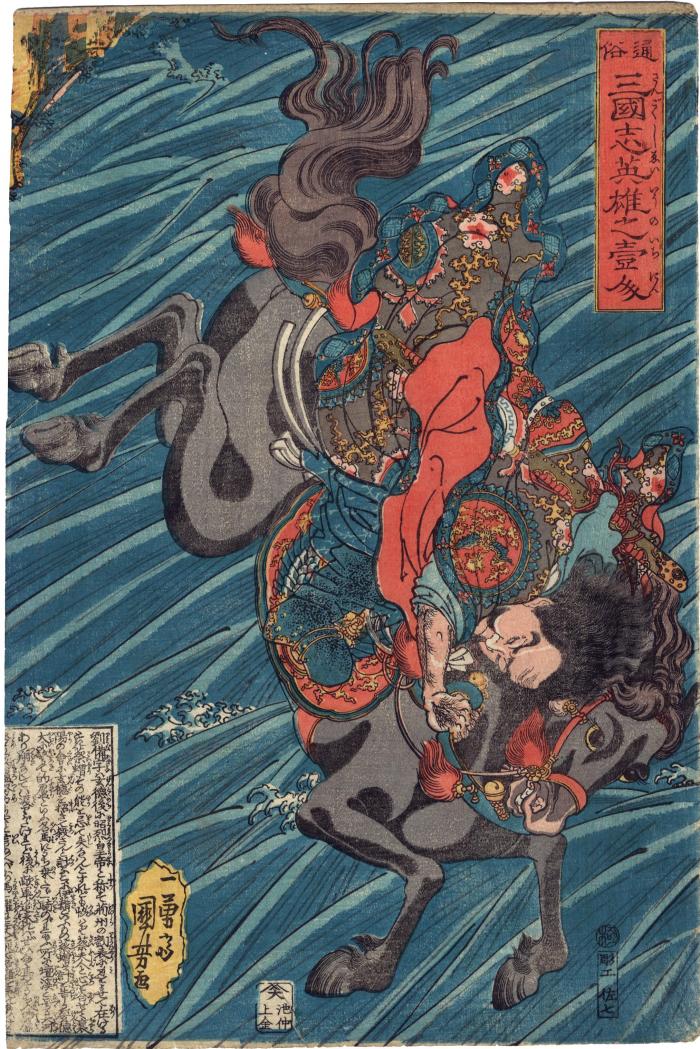Utagawa Kuniyoshi (歌川国芳) (artist 11/15/1797 – 03/05/1861)
Xuande (aka Gentoku - 玄徳) plunging into the Tan gorge - from the series Heroes of the Popular Romance of the Three Kingdoms (Tsūzoku Sangokushi eiyū no ichinin - 通俗三国志英雄之壹人)
ca 1836
10.125 in x 15 in (Overall dimensions) Japanese woodblock print
Signed: Ichiyūsai Kuniyoshi ga
一勇斎国芳画
Publisher: Jōshūya Kinzō
(Marks 192 - seal 22-057)
Carver: Horikō ? (彫工佐七)
Museum of Fine Arts, Boston
British Museum
Honolulu Museum of Arts - titled Ryübi
Tokyo Metropolitan Library Gentoku, the emperor of China, on his black horse Tekiro, plunging into the gorge of Tan. One source for this attribution may come from Japanese Treasure Tales by Kumasaku Tomita and published by Yamanaka & Company in 1906. The setting is 3rd century A.D. China.
"Gentoku was a descendant of the fourth generation of the Emperor Keitei of the Eastern Hung dynasty. Although of Royal blood, he began life in the humble position of a shoemaker..." He was said to be incredibly strong and stood at 7' 6" tall, with hands that hung down below his knees. Clearly his calling was to be a warrior and that is what he became. After he put down an uprising by the 'Yellow Ribbon Rebels' he was rewarded by the emperor and was made governor of Yoshu. But when the emperor was defeated Gentoku lost his position and became homeless. A relative of his, Riu Hio, took him in and even gave him quarters in a nearby castle. This did not please Riu Hio's wife or relatives and they plotted to kill Gentoku. His escape took place when surrounded on three sides the only way out was to the west where there was a cliff overlooking a wide river with a fast flowing current.
"As soon as he realized his position, Gentoku, without a moment's delay, decided to attempt to escape across the river, and without waiting to inform his escort, he threw himself on to his favourite horse Tekiro and bolted towards the water. As soon as it became obvious that the bird was flown, a picked body of horsemen was detached in pursuit, but Gentoku, although he knew the apparent hopelessness of his task, decided in his own mind that "destiny is determined by heaven" gave rein to his good horse and dashed into the river. No one of his pursuers felt himself called upon to attempt to follow the fugitive into the swirling waters, and, fate favouring the bold, Gentoku safely negotiated the dangerous passage and gained the opposite bank, thus escaping the snare so carefully set for him."
"After many desperate battles he at length, in A.D. 221, obtained the sovereignty of Shoku, and died in the following year."
****
"The emperor Gentoku (Chinese: Xuande) urges forward his horse, which rears back in fear. One of the regents of China's Three Kingdoms, Gentoku descended from a line that started with the Kan (Chinese: Han)... His only hope of freedom was to leap from the battlements over the gorge of the Yellow River, a jump of about thirty feet, which he succeeded in doing with his horse, making good his escape."
Quoted from the catalogue offered by Eskenazi Ltd. in 1993: Japanese Netsuke from the Carré Collection, 15 June-9 July 1993.
Jōshūya Kinzō (上州屋金蔵) (publisher)
warrior prints (musha-e - 武者絵) (genre)
Historical - Social - Ephemera (genre)
